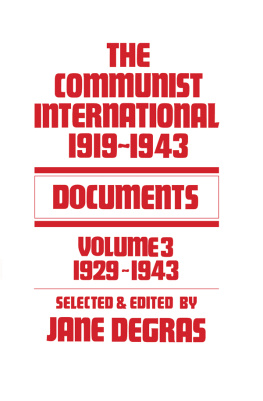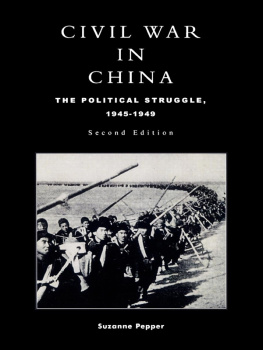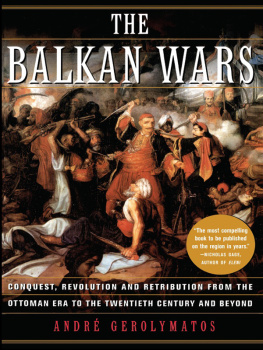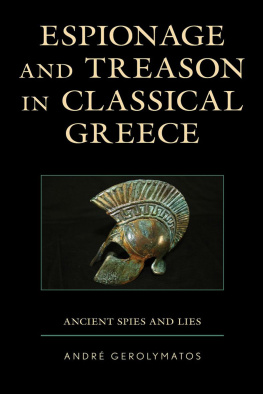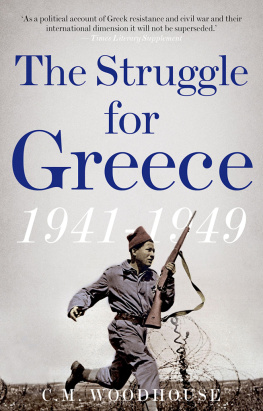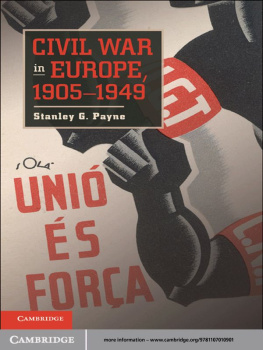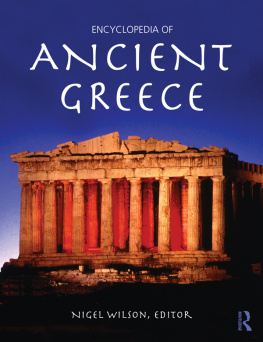Gerolymatos - An international Civil War Greece, 1943-1949
Here you can read online Gerolymatos - An international Civil War Greece, 1943-1949 full text of the book (entire story) in english for free. Download pdf and epub, get meaning, cover and reviews about this ebook. City: Griechenland, year: 2016, publisher: Yale University Press, genre: Politics. Description of the work, (preface) as well as reviews are available. Best literature library LitArk.com created for fans of good reading and offers a wide selection of genres:
Romance novel
Science fiction
Adventure
Detective
Science
History
Home and family
Prose
Art
Politics
Computer
Non-fiction
Religion
Business
Children
Humor
Choose a favorite category and find really read worthwhile books. Enjoy immersion in the world of imagination, feel the emotions of the characters or learn something new for yourself, make an fascinating discovery.
- Book:An international Civil War Greece, 1943-1949
- Author:
- Publisher:Yale University Press
- Genre:
- Year:2016
- City:Griechenland
- Rating:4 / 5
- Favourites:Add to favourites
- Your mark:
- 80
- 1
- 2
- 3
- 4
- 5
An international Civil War Greece, 1943-1949: summary, description and annotation
We offer to read an annotation, description, summary or preface (depends on what the author of the book "An international Civil War Greece, 1943-1949" wrote himself). If you haven't found the necessary information about the book — write in the comments, we will try to find it.
An international Civil War Greece, 1943-1949 — read online for free the complete book (whole text) full work
Below is the text of the book, divided by pages. System saving the place of the last page read, allows you to conveniently read the book "An international Civil War Greece, 1943-1949" online for free, without having to search again every time where you left off. Put a bookmark, and you can go to the page where you finished reading at any time.
Font size:
Interval:
Bookmark:
An International Civil War

Published with assistance from the Louis Stern Memorial Fund.
Portions of this book appeared in an earlier work titled Red Acropolis, Black Terror (New York: Basic Books, 2004).
Copyright 2016 by Andr Gerolymatos.
All rights reserved.
This book may not be reproduced, in whole or in part, including illustrations, in any form (beyond that copying permitted by Sections 107 and 108 of the U.S. Copyright Law and except by reviewers for the public press), without written permission from the publishers.
Yale University Press books may be purchased in quantity for educational, business, or promotional use. For information, please e-mail (U.K. office).
Set in Adobe Garamond type by IDS Infotech Ltd., Chandigarh, India.
Printed in the United States of America.
ISBN 978-0-300-18060-2 (paperback : alk. paper)
Library of Congress Control Number: 2016935986
A catalogue record for this book is available from the British Library.
This paper meets the requirements of ANSI/NISO Z39.48-1992 (Permanence of Paper).
10 9 8 7 6 5 4 3 2 1
To my sister Areti,
With love,
whose courage and stamina in adversity is an example to all of us
The sufferings which civil strife entailed
were many and terrible,
such as have occurred and always will occur,
as the nature of mankind remains the same.
THUCYDIDES , History of the Peloponnesian War, 3.82.1
Contents

Map 1. The Balkans, 1878. Map by Costa Dedegikas.

Map 2. Bases and Organizational Areas of the Democratic Army of Greece, July 1949. Map by Costa Dedegikas.
Preface and Acknowledgments
The Greek civil war was actually three civil wars: three phases of a conflict that raged across Greece and some of the islands, and engaged countries from around the region and beyond. In all three phases, communists and communist-backed insurgents sought to seize control, first of the resistance against the German occupying force (October 1943February 1944), then from the restored Greek government of national unity after liberation (December 1944), and finally, in what historians commonly demarcate the civil war, from 1946 to 1949. But the Greek civil war was also an international war, as competing interests maneuvered for position in the postwar world.
Between 1945 and 1947, Greece was caught in the vacuum of a world in transition. The period just after World War II was a time of change and global realignment. Old empires were in eclipse, and new ones, such as the Soviet Union and the United States, were poised to instigate and dominate world events. The British Empire, which once ruled the waves and controlled one-fifth of the worlds surface, was rapidly declining, forced to relinquish large tracts of its colonial possessions in Asia and Africa and under pressure to relinquish the Middle East. The British, however, were not prepared to surrender every jewel in the crown, particularly in the Middle East. In 1945, the Abadan oil refinery in Iran produced more oil than all the Arab states together80 percent of British petroleum supplies relied on the Middle Eastand was critical to Britains economic recovery. Furthermore, a significant part of Britains trade, including petroleum, was carried on ships that depended on the Suez Canal.
Greece was an essential part of Londons new Middle East strategy, and failure in Greece would have repercussions in Britains postwar grand strategy in the region. In 1945, as had been the case since the nineteenth century, Greece was still within the British sphere of influence. Londons interest in Greece was part of Britains postwar policy that aimed at replacing colonial rule in the Middle East by co-opting the newly independent Arab and Muslim states in a reconstituted British sphere of influence based on mutual interests and security. The new Labour foreign secretary, Ernest Bevin, underlined in a policy paper to the cabinet on 11 August 1945 that we must maintain our position in Greece as part of our Middle East policy, and that unless it is asserted and settled it may have a bad effect in the whole of our Middle East position.
The British were prepared to accept assistance from the Americans to secure the Middle East, but not to relinquish military or economic primacy. In another memo to the cabinet on 17 September 1945, Bevin insisted that Britain should not make any concessions that would assist American commercial penetration into a region which for generations has been an established British market. Events, however, undermined British plans to maintain their suzerainty over the Middle East with only a subsidiary role for the United States. The Iran crisis and the Turkish Straits crisis in the spring and summer of 1946, respectively, followed by the outbreak of the Greek civil war in the same year, made it clear to the British that they lacked the resources to defend the Middle East and Greece; it also convinced President Harry Truman that the United States had to intervene in order to stop Soviet aggression. It is within this context that Greece became an American concernnot so much because of the countrys Balkan location, but because of its geographic proximity to the Middle East through the eastern Mediterranean.
The Truman administration decided to intervene in Greece with financial and military assistance in the form of supplies and advisers partly in response to Londons dramatic announcement that the United Kingdom could no longer provide military and economic sustenance to Greece and Turkey, and that Britains failure to do so would undermine the security of the Middle East. Washington was convinced that Moscow intended to gain control of the Aegean and undermine Turkey and Iran, thus expanding Soviet influence over the emerging postcolonial Arab and Muslim states. In 1946, the communist uprising in Greece was merely a small insurgency. Hostilities quickly spiraled to a full-scale civil war that engulfed northern Greece, parts of the Peloponnese, and some of the Aegean islands. What was, in effect, a Greek domestic crisis quickly escalated into a contest pitting the United States, and, to a lesser degree Britain, against the Soviet Union and its satellites, particularly Yugoslavia, Bulgaria, Albania, and indirectly Romania, Czechoslovakia, and Hungaryat least to the perception of American policy makers. The participation of all these states transformed the Greek fratricide from a regional concern into an international civil war, at least by proxy, and helped inaugurate the Cold War.

FIG . 1. President Harry S. Truman reviewing the troops on Army Day in Washington, D.C., 7 April 1947. On 12 March he had implemented the Truman Doctrine. Abbie Rowe, photographer. U.S. National Archives and Records Administration.
The suggestion for a new history of the Greek civil war originally came from John Donatich, then at Basic Books, who left the company before a previous edition of this book was published. John became director of Yale University Press, and he encouraged me to undertake an updated version of the original publication, Red Acropolis, Black Terror: The Greek Civil War and the Origins of the Soviet-American Rivalry,1943
Next pageFont size:
Interval:
Bookmark:
Similar books «An international Civil War Greece, 1943-1949»
Look at similar books to An international Civil War Greece, 1943-1949. We have selected literature similar in name and meaning in the hope of providing readers with more options to find new, interesting, not yet read works.
Discussion, reviews of the book An international Civil War Greece, 1943-1949 and just readers' own opinions. Leave your comments, write what you think about the work, its meaning or the main characters. Specify what exactly you liked and what you didn't like, and why you think so.



